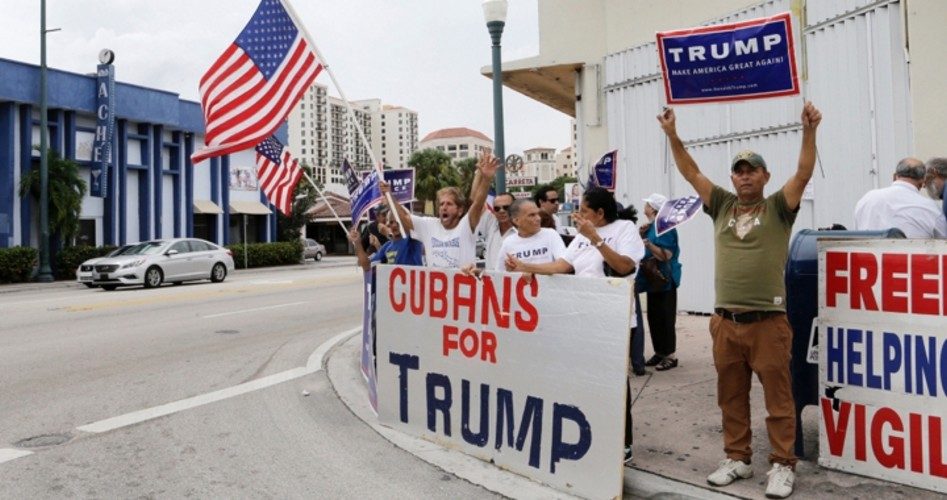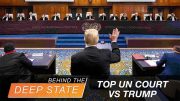
President Barack Obama’s overtures to the Castro dictatorship in Cuba may have won praises in some places in the United States, but within the Cuban-American community in Florida it was deeply resented.
And it may have cost Democratic nominee Hillary Clinton any chance of winning Florida’s 29 electoral votes.
Democrats tend to win more votes among Americans of Hispanic ancestry in comparison to the Republicans. In fact, Democrats and even many Republicans are constantly lecturing the GOP that they need to “reach out” to American Hispanics. But whatever the merits for that argument, one group that the Democrats continue to have trouble with are Cuban Americans in Florida.
Fidel Castro led the communist overthrow of Fulgencio Batista’s government in 1959, touching off an exodus of anti-communists from the island nation. As hard as it is to imagine it now, Cuba was a popular tourist destination before the communist takeover, and it could boast the second-highest standard of living in Latin America.
In early 1961, after Democrat President John Kennedy had promised to provide air support for an invasion of Cuba at the Bay of Pigs by anti-Castro freedom fighters, several hundred Cuban refugees were killed or captured on the beach when that air cover never came. This betrayal caused many Cubans to have a enduring enmity against Kennedy.
Since that time, the fiercely anti-communist Cubans concentrated in south Florida have generally supported Republicans in elections. Democratic Party policies and candidates have only tended to solidify their anti-Democrat stance.
As Frank de Varona, the office manager of the Trump for President headquarters in West Dade County, Florida, explained at a Trump rally in Bayfront Park, “The Democratic Party has injured, at every opportunity, the cause of Cuba’s freedom and the return to self-government. We remember the Mariel exodus that took place under the Carter administration, a Democrat. Elian Gonzalez, the son of a Cuban immigrant who drowned bringing her son to freedom, was returned to Castro’s Cuba under a Clinton White House.”
This year, it was the Obama policy of reopening diplomatic relations with Castro’s Cuba that increased the percentage of the Cubans to vote, and to vote Republican. “And now,” Varona told the rally, held a few days before the November 8 election, “Obama legitimizes the totalitarian government in Cuba to the eyes of the world and provides economic assistance, investment, and tourism in exchange for nothing.”
Additionally, Varona noted, “President Obama is working to undermine or eliminate the embargo.” Under federal law, economic intercourse with Cuba is generally illegal, but as he has in so many other instances, Obama has moved to circumvent the law he swore to uphold. Just a few weeks before the election, the president told American tourists that they could bring back from Cuba unlimited quantities of Cuban rum and cigars.
Then, on October 26, the United States abstained during a United Nations vote expressing opposition to the U.S. embargo on the communist regime. At that point, the New York Times noted that Republican nominee Trump’s poll numbers among the Cuban community began to surge.
Obama’s opening to Cuba and the Castro brothers was touted to create a freer and more prosperous Cuba. But of course it has done the opposite. Political persecution has escalated, with 9,215 political arrests in the first 10 months of 2016, even worse than the 8,616 arrests in the 12 months of 2015.
But, Clinton could not blame all her “Cuban problems” on Obama. She has totally supported his policies, both as secretary of state, and as a candidate for president. Speaking at Florida International University, she promised she would completely terminate the embargo against Cuba with an executive order, were she to win the White House.
Of course, Cubans still remembered the actions of her husband when he was president back in 2000. In November of the previous yeasr, some Cubans, in an effort to escape their hellish life in Communist Cuba, attempted to make it to Florida in a small boat. (Under American law, any Cuban who can make it to the United States is afforded political asylum. Thousands of Cubans have taken advantage of this law, even though inside Cuba it is illegal to leave the country.) That small boat of refugees in 2000 broke up in the rough waters between Cuba and Florida, and the freedom-seeking Cubans perished at sea.
Except for six-year-old Elian Gonzalez. He miraculously survived on a inner tube until he was picked up by a fisherman. Once he reached Florida, his mother’s relatives took him in. But at the request of Communist dictator Fidel Castro, in April 2000 the boy was seized by federal authorities under orders from President Bill Clinton’s Justice Department and sent back to Cuba.
The Cuban community in Florida was enraged, and Miami-based pollster Sergio Bendixen recalled, “It was humiliating to Cuban-Americans, and the 2000 election was payback.”
Considering that Republican Governor George W. Bush of Texas defeated Democrat Vice President Al Gore of Tennessee by less than 600 votes out of six million total cast, any shift in the voting patterns of any group would have been significant. The numbers are remarkable to analyze. In 1996, President Bill Clinton captured 35 percent of the Cuban vote in Florida, but in 2000, his vice-president, Al Gore, managed only less than 20 percent.
In fact, in the Miami suburb of Hialeah, with a large Cuban community, 1996 GOP presidential hopeful Bob Dole defeated Clinton by 10,000 votes; however, in 2000, Republican candidate Bush routed Gore by almost 25,000.
It is estimated that Bush wound up with 50,000 more Cuban votes than Dole had taken four years earlier.
The Trump campaign, sensing an opportunity in Florida after Obama’s recent shameful pandering to the Communist regime in Cuba, made a major effort to drive up the Cuban vote before this year’s election. Endorsed by the Miami-based Bay of Pigs Veterans Association (the first presidential candidate to receive this endorsement in 55 years), Trump held a rally with the group at Little Havana’s Bay of Pigs Museum on October 25 and told the cheering throng, “The United States should not prop up the Castro regime economically and politically, as Obama has done and as Hillary Clinton plans to do. They don’t know how to make a good deal, and they wouldn’t know how to make a good deal if it was staring at them in the face.”
Trump promised that if he were elected, he would reverse Obama’s overture to Cuba.
Other races seem to support the belief that Obama’s favorable treatment of the Castro regime cost the Democratic Party dearly. The one Cuban politician who supported the Obama-Clinton position was Democrat Joe Garcia, trying to win back his old seat in the House, whose GOP opponent drubbed him by 11 points despite the district’s 58 percent Democrat Party advantage. In other races, Senator Marco Rubio (R-Fla.) — who strongly denounced the Obama policy on Castro’s Cuba — easily defeated Patrick Murphy, who had openly supported Obama’s new policy.
These statistics seem to confirm the words of Varona, spoken at the pro-Trump rally at Bayfront Park: “The Cuban exile community feels naturally betrayed by the Democratic Party. Since we have arrived in the United States, in the last 20 years especially, the Democratic Party has been inimical to our values and to the cause of human freedom. We still dream of achieving freedom and self-determination in a free Cuba.”
And that will come only when the Castro brothers are no longer in control of Cuba, and when communism there is assigned to the “ash heap of history.” If and when that ever happens, it will most assuredly not come from aiding and abetting communist regimes while ostensbily opposing them, as has been the case with U.S. foreign policy for many decades under both Republican and Democrat administrations. (For evidence of these betrayals, which include not just Cuba but also Eastern Europe and China, click here.)
Photo: AP Images


